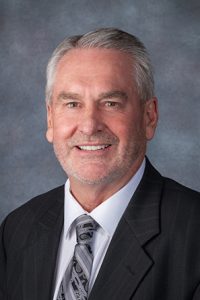Proposal to create ‘parents’ bill of rights’ considered
The Education Committee heard testimony Jan. 31 on a bill intended, in part, to ensure parental access to learning materials and curriculum in public schools.

Glenvil Sen. Dave Murman, sponsor of LB374, said the bill would establish a “parents’ bill of rights” to clarify the principle that parents, not “educational bureaucrats,” are the foremost decision makers in their children’s lives.
Murman said he introduced the bill because of parents’ concerns about comprehensive sex education standards considered by the State Board of Education in recent years.
Under LB374, parents could request that books, magazines, images and other library content that contains certain sexual content or “excessive” profanity or violence be designated as inappropriate for minors.
The bill also outlines a process by which parents could challenge the educational benefit of an item of library content. If a challenge is upheld, the item would be removed.
LB374 would require school districts to create an internet-based tool with which parents could access learning materials, activities and curriculum used for student instruction, as well as other information.
Additionally, the bill would prohibit schools from administering an attitude or belief examination to a student without parental consent.
Murman said LB374 also would prevent schools from requiring students or teachers to “adopt, affirm, adhere to or profess” certain teachings, including that individuals “bear collective guilt and are inherently responsible for actions committed in the past by other members of the same race, ethnicity, color or national origin.”
Teachers who refuse to teach those ideas or other matters that contradict their sincerely held religious beliefs could not be subject to “adverse licensure or employment action” because of that refusal.
Finally, the bill would allow a parent, student or teacher aggrieved by a violation to bring a civil action for appropriate relief, including actual damages and attorney’s fees.
Robbie Adams testified in support of LB374, saying she was “appalled” by parents’ recent discovery of sexually explicit books in school libraries and the “sexualization of children by curriculum wholly inappropriate for any school setting.”
“Schools must be free of political and social agendas and dedicate the school day to the primary goal of dissemination of basic knowledge and skills,” Adams said. “Transparency makes schools accountable.”
Marni Hodgen also testified in support. She said many Nebraska parents feel they have little say over what their children learn in school. LB374 would give parents easy access to curriculum and the power to decide whether certain books are appropriate for students, Hodgen said.
Shavonna Holman testified in opposition to the bill on behalf of Omaha Public Schools. She said the district’s curriculum review and textbook approval processes already include parent input and require board approval at a meeting that is open to the public.
Holman said making learning materials available on the proposed portal would require a significant investment of time and financial resources. Additionally, she said, the bill could give every parent veto authority over virtually any of the district’s educational programs.
“Should we really be giving a single parent the right to dictate the education of all of our children?” Holman said.
Tim Royers testified in opposition to LB374 on behalf of the Nebraska State Education Association. He said many of the bill’s components are redundant to existing state law or proposed in response to “nonexistent concerns” about things public schools are not allowed to do, such as direct a child’s religious training.
“We are not opposed to transparency,” Royers said. “But this bill does not promote transparency — it promotes an image that teachers are a danger to kids and not to be trusted.”
Also in opposition was Khenda Mustafa of Nebraska Appleseed. She said the proposal would have a chilling effect on classroom discussion of American history, particularly race-based laws and institutions that continue to cause economic, social and civic disparities for Black people, indigenous people and other people of color.
“Past history is not our fault,” Mustafa said, “but it is our opportunity and our responsibility to understand and fix it together to prevent future disparities and harm.”
Rachel West testified in opposition to the bill on behalf of the Nebraska Coalition to End Sexual and Domestic Violence. She said LB374 could prevent schools from offering students evidence-based, age appropriate programming intended to prevent sexual and dating violence.
The committee took no immediate action on the bill.


